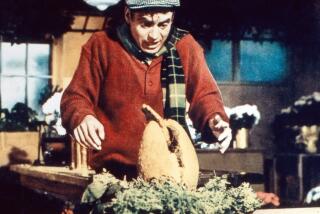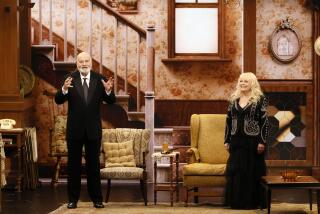Scenes from Norman Corwin’s life: A couple of geniuses and a kiddie toy
When Norman Corwin died a year ago, he was a mere stripling of 101 years. His father had lived until 110 and his brother, Emil, to 107.
Norman was the “poet laureate of radio,” a shorthand phrase for a very big life. He was the subject of an Oscar-winning documentary and was an Oscar nominee himself for his screenplay for “Lust for Life,” and was a superlative writer in any medium, from plays to limericks. His radio program for the 150th anniversary of the Bill of Rights, which aired barely a week after the 1941 attack on Pearl Harbor, had a cast that included Orson Welles, Jimmy Stewart, Lionel Barrymore-- and President Franklin D. Roosevelt delivering the wrap-up remarks. Nearly half of all the people in the U.S. listened to it.
Nearly four years later, about as many people listened to Corwin’s “On a Note of Triumph,” commissioned by FDR for the end of World War II. People who were alive to hear it can, to this day, still recite whole passages from it.
One of those was Norman Lear, the renowned producer who, along with the estimable actor Norman Lloyd, was one of the Norman triumvirate -- friends and mutual admirers. On Saturday at a memorial celebration for him at the Skirball Center, those two spoke of Corwin’s intellectual force, his unfailing moral compass, his adroit wit.
Other Corwin compadres spoke too, among them Stan Freberg, actress Marsha Hunt, film critic Leonard Maltin, USC’s Geoffrey Cowan and, in absentia, Eva Marie Saint and her husband, Jeffrey Hayden -- their words read by Samantha Eggar and Susan Albert Loewenberg -- and not last but certainly least, me.
Out of this stupendous array of Corwin admirers and the striking excerpts of his radio and film work, any one of which would have crowned a career, came one astonishing moment that didn’t star Norman at all.
It was a few seconds of home movies, taken in Corwin’s backyard evidently sometime in the late 1950s, with Corwin’s children clowning around and climbing all over his house guest -- the snow-haired, perpetually windblown Carl Sandburg.
The audience uttered a little gasp when they realized who it was, just as audiences do in the movies. The Corwin kids were giving Sandburg a smooch, and he was delivering an avuncular one in return. And then, oh yes, he did -- Sandburg, the poet of the American soul, three times the winner of the Pulitzer Prize -- tried twirling a hula hoop around his hips.
And then, with a large microphone looped around his neck, Sandburg -- something like 50 years before the smartphone -- sat in the Corwin garden ruminating, predicting that we would one day watch a kind of hand-held television “a little bigger than a wristwatch,” something so small and portable that we could walk along the street and see it.
It’s a measure of Corwin that this was the kind of company he kept, and the kind of person who wanted to keep company with him.
As I said in my remarks, generations ahead of ours will discover his work and delight in it, and think, as we now do of people like Mark Twain, “Oh, I wish I had known him.” And we, lucky us, will have.
ALSO:
In defense of academic freedom
Pricing the 1st Amendment out of existence
More to Read
A cure for the common opinion
Get thought-provoking perspectives with our weekly newsletter.
You may occasionally receive promotional content from the Los Angeles Times.











